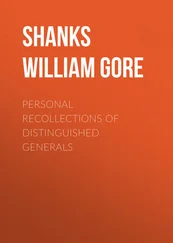CO, Kradschützen (Motorcycle Rifle) Battalion 34/4.Pz.Div. was Major Erich von Stegmann (6.4.1896–?), succeeded on 9.1.1942 by Rittmeister Bradel. Neumann, ‘Die 4.Panzer Division’, p. 444.
See note 375 375 Generaloberst Hans Jürgen Stumpff (15.6.1888–9.3.1968). At this time Stumpff was C-in-C, Luftflotte Reich. His jurisdiction was not affected by 20 July, nor was he mentioned in Hitler’s speech. Since it is unlikely that Sponeck and Stumpff met in the war, having regard to their respective military duties, Sponeck had probably been influenced by Bassenge. The latter was Stumpff’s Chief of General Staff at Luftflotte 5 between 1.8.1940 and 4.10.1940, and had said of his superior on 21.7.1944, ‘Stumpff is the biggest twit you can imagine. I was his Chief of Staff. So, I was glad, I mean really glad, when I got away from him. Appalling.’ SRGG 961, 21.7.1944, TNA WO 208/4168.
below.
On 20.12.1941 during a five-hour talk with Hitler, Guderian attempted to convince him to rescind his order of 16.12.1941 to halt. On 25.12.1941 Guderian was relieved of command after retreating without authority. Reinhardt, ‘Die Wende vor Mosakau’, pp. 225, 228. In his memoirs Guderian provided a much less dramatic version of the conversation than Thoma does here. Guderian, ‘Erinnerungen eines Soldaten’, pp. 240–6. Thoma stayed in Berlin from 1 to 7.8.1942 to accept his promotion to Generalleutnant, and visited Guderian on the morning of 5.8.1942. Diary 1942, BA/MA N2/2 and note 393 393 In February 1944, Guderian was assigned the Polish estate Deipenhof in the Reichsgau Wartheland for the equivalent of RM1.24 million. The German Reich dispossessed the Polish owners. Ueberschär/Vogel, ‘Dienen und Verdienen’, pp. 169–72.
below.
General der Infanterie Rudolf Schmundt (13.8.1896–1.10.1944) had been Chief Wehrmacht Adjutant to Hitler from 28.1.1938, and from 1.10.1942 Head of the Army Personnel Bureau. He saw it as his mission to bind the Army to Hitler and National Socialism. Schmundt was not free of idealism and spared no effort to assist the commanders at the front. As an ardent admirer of Hitler he would not allow any kind of criticism of the Führer. See Stumpf, ‘Rudolf Schmundt’, and also short biography in ‘Tätigkeitsbericht Schmundt’, pp. 15–22.
Also Peter Hoffmann, ‘Die Sicherheit des Diktators’; Seidler/Zeigert, ‘Führerhauptquartiere’, pp. 97–110, provide an overview of Hitler’s burgeoning self-protective measures.
See note 49 49 Hennecke refers to the three heavy daylight raids on Munich on 11, 12, and 13.7.1944 in which 2,807 B-17 bombers of the 8th USAAF dropped 5,783 tonnes of bombs and inflicted great damage on the city; 1,613 persons lost their lives, 3,955 were injured as the result of the attacks. Permooser, ‘Luftkrieg im Raum München’, pp. 321–41.
above.
These names were not mentioned in the radio bulletins. The first report broadcast by German radio was an official announcement of the attempted assassination and stated only that Hitler had survived a bomb attempt unscathed and had received Mussolini for a long conference. The text is reproduced in Domarus, ‘Hitler’, Vol. 2, p. 2127. See also Peter Hoffmann, ‘Staatsstreich’, p. 540.
Hitler’s radio address towards midnight on 20.7.1944 appears at Domarus, ‘Hitler’. According to this transcript Hitler’s concluding words were, ‘In this I see a finger of Providence indicating that I must continue my work, and therefore I shall!’
It is not known in what capacity Reimann was involved with the NSDAP in the 1930s.
On 21.7.1944 a communiqué was issued regarding the introduction of the ‘Hitler salute’ throughout the Wehrmacht as advocated by Dönitz, Goering and Keitel. The Army was not mentioned in the text. In his address on the evening of 20.7.1944 Hitler did speak about the obedience to orders of the German Army. Domarus, ‘Hitler’, Vol. 2, pp. 2129–31.
For the reactions of Thoma and Bassenge to the assassination attempt see SRGG 961, 21.7.1944, TNA WO 208/4168. Both believed initially in the possibility of a simulated attempt as a pretext for a purge. Thoma’s first reaction was, ‘Now it has begun internally. I always told you… I know Stauffenberg very well. I was with him, Graf Stauffenberg, at HQ and he was always quite frank with his opinion, which was also mine’.
Oberst Claus Schenk Graf von Stauffenberg (15.11.1907–20.7.1944), 1938 – May 1940 Staff Officer Ib, 1.Light-Div.; May 1940 – February 1943 OKH Organisations-Abt.; February – April 1943 Staff Officer Ia, 10.Pz.Div.; 7.4.1943 seriously wounded, low-level air attack. Lost an eye, his right hand and two fingers of left hand; 1.10.1943 Chief of Staff, General Army office; 1.7.1944 Chief of Staff, C-in-C, Ersatzheer (Replacement Army). Peter Hoffmann, ‘Stauffenberg’.
This protocol confirms the details that Broich made in 1962 about his conversations and attitude towards Stauffenberg. See ibid., p. 273f. For his visits to commanders at the front see note 387 387 In September 1942, Stauffenberg visited General der Infanterie Georg von Sodenstern (15.11.1889–20.7.1955), Chief of General Staff, Army Group B, and the Cmmdg Gen. XXXX.Pz.Korps, Leo Freiherr Geyr von Schweppenburg, and attempted without success to recruit them for the planned assassination of Hitler. On 26.1.1943 he attempted to persuade Generalfeldmarschall Erich von Manstein to head a coup d’état, which he declined. One cannot simply say that Manstein was the only field marshal ‘who had not gone along with it’. Broich repeats here Stauffenberg’s impressions on the field marshals as a whole. Stauffenberg could only infer from Henning von Tresckow’s soundings that Feldmarschall von Kluge was not opposed to a conspiracy but did not want to be part of it. At that time Stauffenberg could only have been certain of the support of von Witzleben. After the conversation with von Manstein, Stauffenberg remarked, ‘These guys are either shitting their pants or have straw heads, and don’t want it.’ Peter Hoffmann, ‘Stauffenberg’, pp. 250, 252f, 262f, 265–8. Broich was of the opinion in October 1943, from a conversation with Bassenge, ‘that all had said they were ready’, but none wanted to lead it. ‘Manstein is the only one who said… the time is not yet ripe, and he rejected it absolutely, and it is madness.’ SRGG 506, 24.10.1943, TNA, WO 208/4166.
below.
Heinrich Himmler became C-in-C, Ersatzheer and Heinz Guderian Chief of Army General Staff. Presumably Sponeck had listened to Hitler’s radio broadcast on the night of 20.7.1944 and misheard. In his speech Hitler stated that he had appointed Himmler C-in-C of the Heimat (i.e. Homeland) Army. See note 367 367 These names were not mentioned in the radio bulletins. The first report broadcast by German radio was an official announcement of the attempted assassination and stated only that Hitler had survived a bomb attempt unscathed and had received Mussolini for a long conference. The text is reproduced in Domarus, ‘Hitler’, Vol. 2, p. 2127. See also Peter Hoffmann, ‘Staatsstreich’, p. 540.
above for the speech.
Generaloberst Hans Jürgen Stumpff (15.6.1888–9.3.1968). At this time Stumpff was C-in-C, Luftflotte Reich. His jurisdiction was not affected by 20 July, nor was he mentioned in Hitler’s speech. Since it is unlikely that Sponeck and Stumpff met in the war, having regard to their respective military duties, Sponeck had probably been influenced by Bassenge. The latter was Stumpff’s Chief of General Staff at Luftflotte 5 between 1.8.1940 and 4.10.1940, and had said of his superior on 21.7.1944, ‘Stumpff is the biggest twit you can imagine. I was his Chief of Staff. So, I was glad, I mean really glad, when I got away from him. Appalling.’ SRGG 961, 21.7.1944, TNA WO 208/4168.
Читать дальше
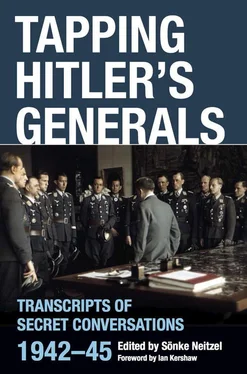

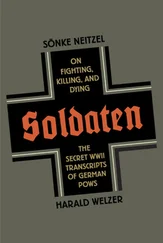
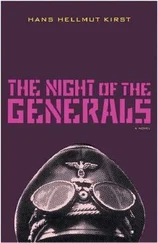


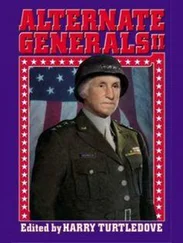

![Traudl Junge - Hitler's Last Secretary - A Firsthand Account of Life with Hitler [aka Until the Final Hour]](/books/416681/traudl-junge-hitler-s-last-secretary-a-firsthand-thumb.webp)



